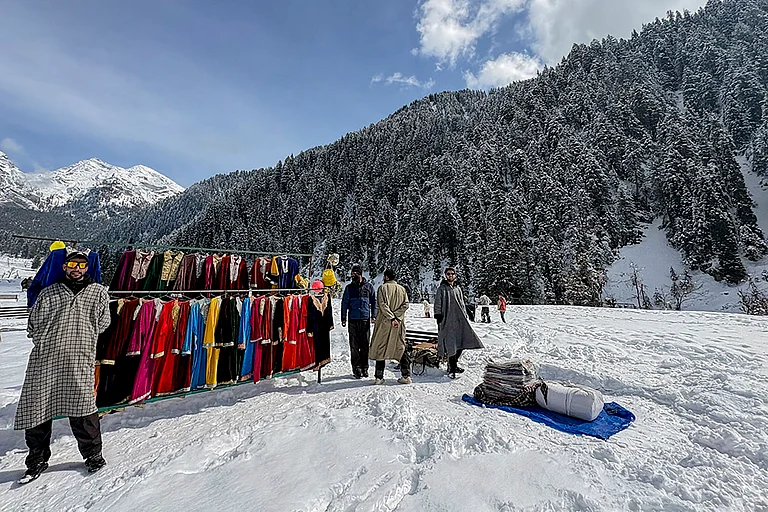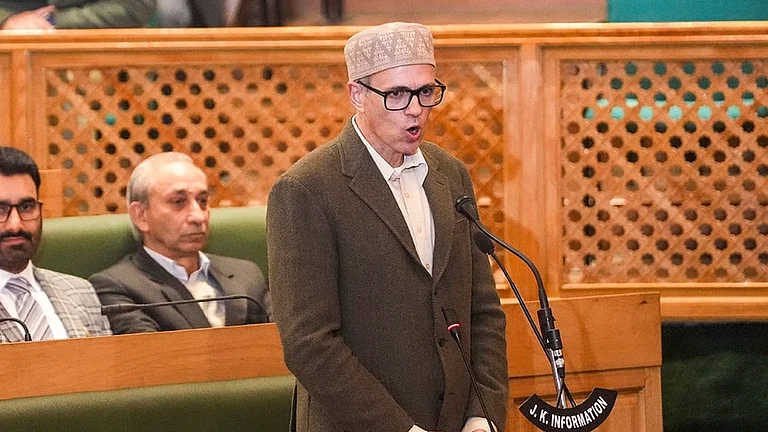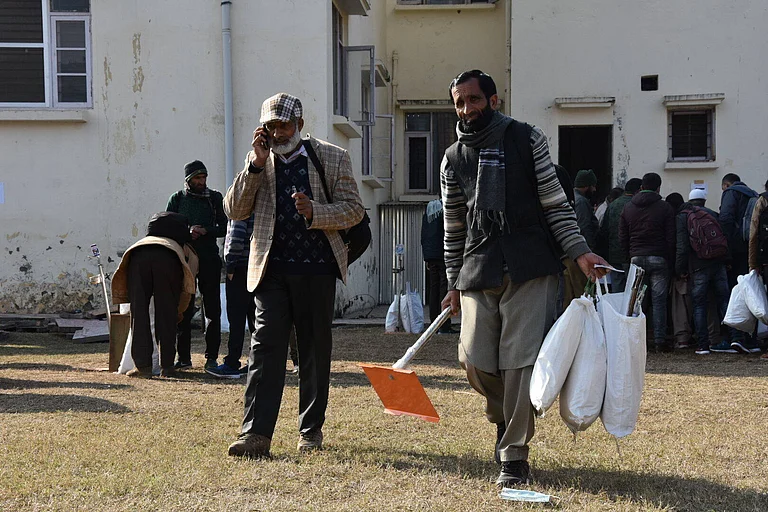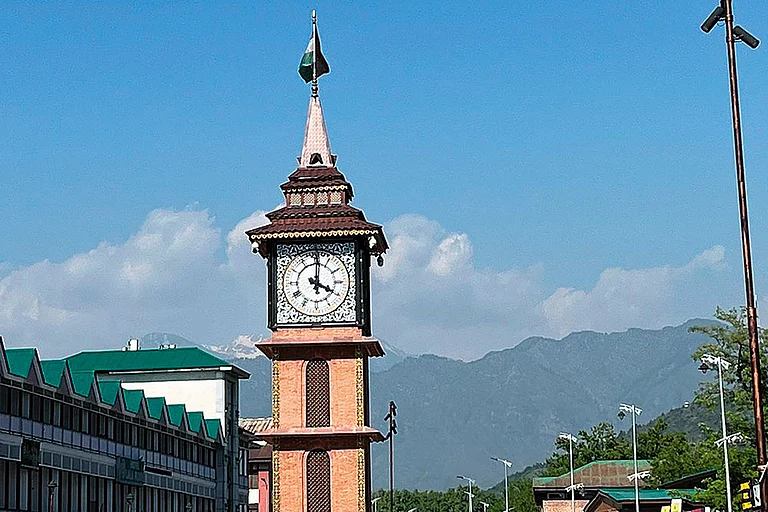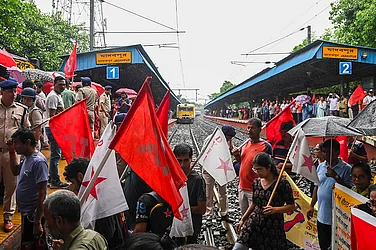With Pakistani poet Faiz Ahmad Faiz's famous poem "Bol ke lab Azad hain tere" (Speak, for your lips are free) displayed prominently in his room at Gupkar road, CPI(M) leader M Y Tarigami says while Kashmiris remain silent, others are speaking up.
Ladakh, he says, is seeking sixth schedule status, with some even advocating for a reunion with the erstwhile state of Jammu and Kashmir. "People in Jammu protest against the lack of business opportunities, and employment protection, and ask for land security. In Kashmir, silence is enforced. If the government considers this silence normal, they are deluding themselves," he adds.
Tarigami says that mainstream political parties in J&K have deep roots, similar to their counterparts elsewhere in India. "The BJP tried to replace the mainstream but failed... the BJP claims the lotus will bloom here. While the lotus indeed blooms, it is not the BJP's symbol but the real lotus flourishing in Dal Lake," he adds.
Tarigami, the state secretary of the CPI(M), is a major political figure in Jammu and Kashmir. Since 1996, he has consistently won Assembly elections from his constituency, representing a unique communist voice in the region. His political journey began in 1970, and in 1979, he was arrested under the Public Safety Act for his activities as a young communist worker. "They replaced all good laws of J&K after the abrogation, including the Agrarian Reforms Act, but retained the Public Safety Act," he tells Outlook in an interview.
Here are the excerpts:
Outlook: What has been the impact of the abrogation of Article 370 on J&K?
Tarigami: The impact has been deep on people. Let me revisit history. The Dogra rule in J&K state was autocratic. It was not only autocratic but a feudal rule. However, the Dogra ruler in 1927 came up with a mechanism for protection for residents of Jammu and Kashmir. He listed J&K citizens as permanent residents and bestowed certain rights upon the people of J&K. After 1947, under the Constitution of India, those rights continued under Article 35(A). They were for the good of people, brought development, and gave an egalitarian shape to the J&K state. On August 5, 2019, all these rights enjoyed by the residents of J&K were taken away after people were locked down and their leaders were imprisoned. This is how the BJP executed their political agenda.
Along with the abrogation of Article 370, they also abrogated Article 35A. Remember, Article 35A was about protecting the permanent residents' rights, identity, land rights, and employment. They changed the boundaries of the state of J&K without having any debate about it. They dismembered J&K state without the consent of the people of Jammu, Kashmir, or Ladakh. Then you are asking what has been the impact.
In every society, you must have the choice to vote freely, talk freely, and walk freely. This is fundamental to every society. People have been deprived of very basic rights. It is like being in a prison, undeclared of course. August 5, 2019, was an attempt to delink me from my history and it didn’t end there. The process continues. Since then, every day you come across something and you feel there is no end to it.
Outlook: What has been its long-term impact?
Tarigami: I feel the decision taken on August 5, 2019, reflects the short-sightedness of those who did it without realizing how it would impact people. It was an assault on Kashmiri ethos. Not only Kashmiri ethos, look at what is happening in Ladakh. I remember long before the abrogation of Article 370 there were agitations in Leh with parties seeking Union Territory. Today they are asking for a reunion with the erstwhile state of J&K. They have been on the streets. They say they were better off in the erstwhile state of Jammu and Kashmir. Even in minus 50 degrees, they were on a hunger strike. They are demanding statehood. People in Jammu are on the streets saying they don’t have any business, no employment protection, and no protection for their land. In Kashmir, they have imposed silence. If silence is normal to them, let them remain in this delusion.
Outlook: How do you see the general election results in Kashmir as the ECI says for the first time a large number of people came out to vote?
Tarigami: It is true people came out to vote. It was, however, not for the first time. If you check the record of the ECI, J&K has seen a higher percentage of voting earlier also. But the question is the BJP didn’t contest the election. They cannot fight elections here as they know they have done nothing and they wouldn’t even get a few votes. They stayed away from the polls.
Outlook: How are political parties seeing the poll result?
Tarigami: A few months after the abrogation of Article 370, the government of India brought a European and American diplomatic delegation to Kashmir. A reception was organized. But none of the mainstream parties were invited to the meeting. In the larger discourse, what was the attempt all about? It was an attempt to reorganise the polity of J&K. But where are all those attempts to replace the mainstream political parties in J&K? They are nowhere. Those people are nowhere. The mainstream political parties are rooted in J&K, like their counterparts in other parts of the country. The BJP always says the lotus will bloom here. The lotus blooms here but it is not of the BJP and its proxies. It is the real lotus which is in bloom in Dal Lake.
Outlook: Under the Reorganisation Act, a lot of orders are coming up. Recently more powers were given to the LG. How do you see it?
Tarigami: What is the J&K Reorganisation Act? What is it? It is part of delinking Kashmir from its past. It is part of delinking Jammu from its past. The recent order is part of that process. Delink people from their political links that were giving more power to representatives of people. The powers are transferred to those who are not elected. The BJP carried out a delimitation exercise in J&K and instead of population, made geography the basis of the electoral realignment giving six seats to Jammu and one to Kashmir. They carved out a South Kashmir seat making Rajouri-Poonch districts of Jammu part of South Kashmir with the sole attempt to divide the voters. In the parliamentary election, the project to divide and undermine the mainstream political parties was defeated. Some of us are saying why not Assembly elections? For the past five years, they have been trying to reorganize polity in such a way that in any future Assembly, the BJP’s lotus should be a dominant factor. It is not happening and it is not happening soon even though they created five more nominated seats, those five seats will be nominated by the nominated LG.
Outlook: What about the Enemy Agents Act being made operative?
Tarigami: We already have UAPA and other stringent laws in place. Now, they talk about the Enemy Agents Act. But in the larger discourse, the Public Safety Act (PSA) is often forgotten. I was the first person arrested under the PSA in 1979. Earlier land laws have been abolished, but the PSA has been retained. This act, originally a J&K law, has been retained because it is dear to them and under it, they book anyone without even having to apply the mind. Even most of these cases are later quashed by the courts for the “non-application of the mind.”
Outlook: When will J&K Assembly elections be held?
Tarigami: The BJP has been claiming that since abrogation J&K has seen unprecedented normalcy. You have been stating it in every forum. In fact, normalcy was touted as a criterion to justify the abrogation of Article 370. Still they didn’t conduct Assembly polls.
You have been saying for the first time people have participated in the District Development Council elections in 2020 or the Parliamentary elections in 2024, though the fact is people have been voting in good numbers even earlier and in much more troubled situations. Check the figures of the 2014 parliamentary and Assembly elections. Still, they desist from holding Assembly elections.
Now we have a situation in Jammu. My point is to stop infiltration and make the infiltration grid stronger. Instead, you are talking about implementing the Kashmir Model in Jammu. If tomorrow something happens in Kashmir, will you impose the Jammu model?
They have not made J&K part of Indian Democracy and Constitutional Order even after the abrogation of Article 370. Had they, things would not have gone this far. It is unprecedented in the electoral history of India that the Supreme Court has to give directions to the ECI to hold Assembly elections in J&K. Even now, no one knows what will happen.







